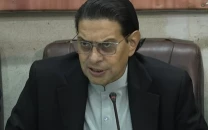Pakistan says executions won't impact EU trade deal: FO
Says EU understands Pakistan's position under which it has removed moratorium

PHOTO: ONLINE
“This issue will not impact the EU GSP plus status for Pakistan,”Foreign Office spokesperson Tasnim Aslam said, during her weekly press briefing in Islamabad, according to Radio Pakistan.
The EU granted Pakistan "GSP+" status in 2014 conditional on Pakistan enacting certain commitments on human rights. The deal means firms pay no tax on certain categories of goods exported to the 27-nation bloc for 10 years.
Responding to the European Union’s concerns on capital punishment in Pakistan, the spokesperson said that it is not a violation of international human rights law.
“Pakistan has its own Constitution and legal system which contains death penalty within the parametres of international laws,” Aslam said.
“It is the fundamental right of the State to protect the lives of its people,” she added.
Read: Govt to completely lift moratorium on death penalty
The moratorium was partially lifted following the December 16 terrorist attack on the Army Public School, and sentences were carried out for those convicted in terror cases. So far, nearly two dozen convicts have been executed.
The government recently decided to also lift the moratorium for those on death row for non-terror convictions.
“According to Article 6 of International Covenant on Civil and Political Rights every human being has the right to live and that this right should be protected by law. The actions that Pakistan is taking are in pursuance to this article in order to protect the lives of the people,” Aslam upheld.
The spokesperson said Pakistan is engaged with the European Union and clarified its perspective on the matter.
Aslam maintained the European Union also understands Pakistan's position under which it has removed the moratorium on death sentence.
The EU called on Pakistan to reinstitute the moratorium and to respect fully all its international obligations, in particular the principle of fair trial.
Read: Government hangs 12 convicts in largest execution since moratorium lifted
The EU is against capital punishment in all cases and without exception, and has consistently called for its universal abolition.
The Union also recalled that Article 6(5) of the International Covenant on Civil and Political Rights, to which Pakistan is a party, specifically prohibits the use of the death sentence for crimes committed by persons below 18 years of age.
Mumbai attacks case
Shifting her focus to the Mumbai attack case, the spokesperson said the trial is continuing and Pakistan wants to see culmination of this process at the earliest.
“The trial got delayed not because of Pakistan but because New Delhi had not given access to our judicial commission to examine witnesses in India,” Aslam said.
Read: Lakhvi's case should not affect talks between Pakistan, India: Aziz
She further said the trial in the Samjhota terror attack in which several Pakistanis were killed has not yet started.
“We should not have double standards in acts of terrorism,” she upheld.
Afghan reconciliation
Responding to a question regarding the Afghan reconciliation process, Aslam said the process is vital for lasting peace and stability in Afghanistan and the region.
“Pakistan has welcomed the dialogue offer by the Afghan government to the Afghan Taliban to resolve political differences. We welcome the renewed prospects of talks between the Afghan government and Afghan government.”
Read: Afghanistan urges China to press Pakistan to make sincere efforts towards peace talks
Pakistan on its part will continue to support and facilitate the process in every possible manner, said, adding, "However, this process should be Afghan led and Afghan owned,” she added.



















COMMENTS
Comments are moderated and generally will be posted if they are on-topic and not abusive.
For more information, please see our Comments FAQ